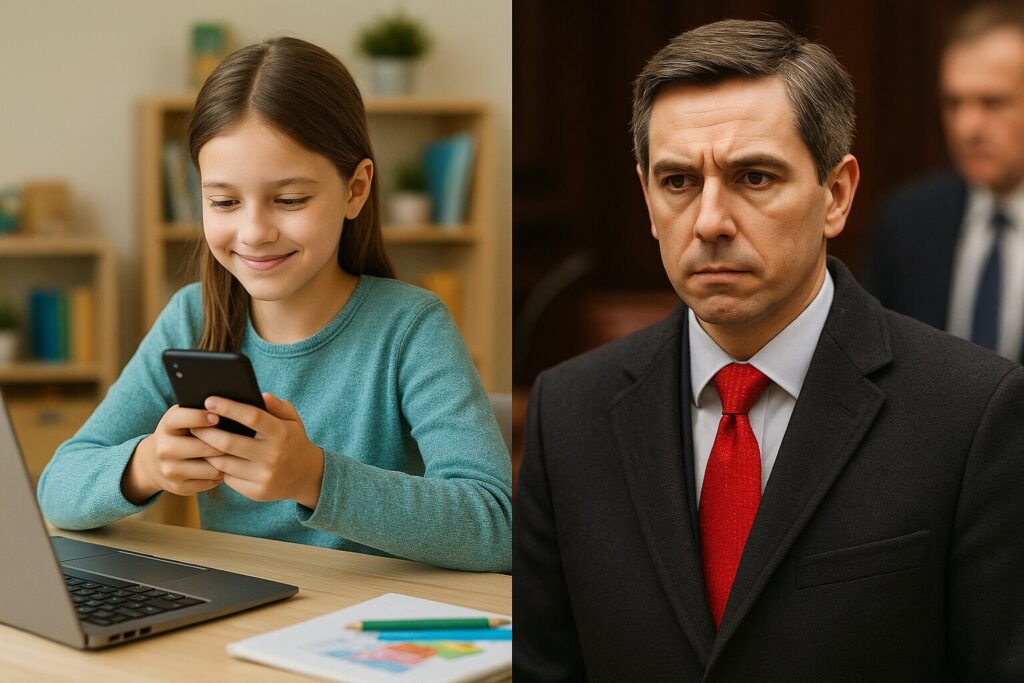There’s been a lot of talk lately about banning children under 16 from social media in Ireland. Tánaiste Simon Harris called smartphone use among young people a “ticking time bomb.” Now the government wants to follow Australia’s lead, where lawmakers are introducing some of the world’s strictest rules on underage social media use.

At first glance, this sounds like decisive action. It looks like they’re protecting children, holding Big Tech to account, and getting serious about online harm. However, if you look a little deeper, you’ll see what’s really happening. Politicians are falling back on an outdated, reactionary approach that blames children and parents instead of tackling the real issues.
History Repeats Itself
This kind of panic isn’t new. Every generation faces moral outrage over emerging technologies. For example, people once criticised novels for corrupting minds. They warned that radio and television would damage attention spans. They blamed video games for antisocial behaviour and violence.
Today, they have shifted their focus to social media. Politicians don’t understand it, and they’ve failed to regulate it properly. Rather than putting in the work to build informed policies, they take the easy route and call for a ban.
Social Media Isn’t Inherently Harmful
Let’s be clear. Social media can cause harm, but it isn’t harmful by design. These platforms are tools, and what matters is how people use them.
In fact, for many young people, social media provides a lifeline. They find community, share creativity, and access support they may not get elsewhere. Teens use these platforms to learn new skills, launch businesses, organise around causes, and connect with peers who understand them. Therefore, banning them outright doesn’t protect them. It isolates them.
Yes, online risks exist, including cyberbullying, misinformation, and manipulative algorithms, but bans won’t solve these. We need smart regulation, not blanket prohibition.
The Government’s Convenient Morality
Let’s not pretend the Irish government has suddenly discovered its moral compass. This is the same administration that fought to avoid collecting €13 billion in unpaid taxes from Apple. When it comes to Big Tech profits, the government stays quiet. Yet when public pressure builds, it targets the easiest scapegoats, such as kids and parents.
The government failed to regulate tech companies for years. Instead of confronting platforms and demanding accountability for harmful practices, it offers performative solutions that play well in headlines but do little in practice.
What Ireland Should Actually Do
If Ireland wants to protect young people online, banning them from social media isn’t the answer. Rather, real solutions include:
- Enforcing stronger regulations on data use, advertising, and recommendation algorithms
- Integrating digital literacy education into school curriculums
- Requiring meaningful moderation and age-appropriate content tools
- Equipping parents and educators to guide social media use with knowledge, not fear
This is the meaningful work. Instead of building walls to keep young people out of digital spaces, we should create safer spaces they can grow up in. Social media isn’t going away. Within a generation, toddlers will already have digital footprints. Avoidance won’t protect them. Only preparation will.
Final Thought
Banning children from social media doesn’t solve anything. It pushes use underground, avoids the real issues, and lets governments dodge their failure to regulate tech properly. Kids don’t need censorship. They need support, education, and protection from the companies profiting off their time and attention.
Ultimately, it’s time to stop blaming the kids and start holding the adults accountable.
Leave a Reply